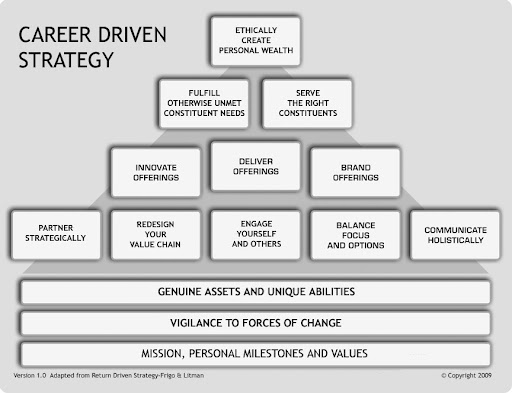This first—and HIGHEST—tenet of business strategy is what will keep your firm in the right direction…
| From the desk of Miles Everson: Happy Tuesday! Welcome to today’s edition of “Return Driven Strategy (RDS)!” For those of you who don’t know yet, RDS is a pyramid-shaped framework with 11 tenets and 3 foundations. When applied properly, these principles help businesses achieve their objectives. Today, let’s delve deeper into the 3rd foundation of RDS. Read on to better understand what the highest goal of every firm or organization should be in the long run. |
|
This first—and HIGHEST—tenet of business strategy is what will keep your firm in the right direction… What do you think should be the highest or ultimate goal of every company or organization? To generate profit? To expand their reach? To overtake their competitors? There’s actually nothing wrong with having these goals in a firm. After all, one puts up a business with a goal of wealth-creation of some sort. However, if these goals are listed down with the wrong intentions, they could lead companies towards the wrong direction. In fact, in the context of Return Driven Strategy (RDS), businesses should operate and strive to achieve their goals with this “ultimate goal” in mind.
The Role of Ethics in Business According to Professor Joel Litman and Dr. Mark L. Frigo in the book, “Driven,” the highest tenet of Return Driven Strategy—and what businesses should aim for—is to Ethically Maximize Wealth. Why? It’s because this goal provides the anchor that will help management make the right decisions as they develop and execute business strategies. In Professor Litman and Dr. Frigo’s words: “Strategic performance measures must be focused on maximizing financial value creation, something many companies fail to do because of misaligned compensation plans and/or misdirected motivations.” Think about this: Performance measures can either lead to maximum wealth-creation or create perverse incentives . Flawed financial metrics lead businesses in the wrong direction. Increases in revenues and earnings per share (EPS) are still widely reported as primary metrics of determining value creation, but when business decisions are based on those metrics, wealth-destroying activities have often resulted. What else? Value-destroying mergers and acquisitions can drive growth at the expense of cash flow returns. In fact, a strategy of under investment or “harvesting” assets may increase accounting profits, but actually destroy wealth for the long term. Hewitt Associates even found evidence in one study that companies with management compensation highly aligned with traditional metrics, like sales and EPS, appear to be the worst performers in shareholder returns. So… what should be the solution to this? According to Professor Litman and Dr. Frigo, companies must ensure adherence to the “ethical component” of the first tenet of business strategy. In other words, a firm must develop and review performance measures or even “markers” that indicate when activities are moving out of bounds of expected ethical behavior. Besides, companies that violate ethical behavior run the distinct risk of losing tremendous levels of value and even the ability to remain. Professor Litman and Dr. Frigo say various performance measures can help track whether or not a firm is staying within the bounds of ethical behavior. These include:
Each of these may alert management to unhealthy trends. … but wait! Let’s not forget that everything that happens to a firm starts internally , NOT externally. That’s why one of the real concerns is the development of internal measures to monitor and control the financial reporting systems . Professor Litman and Dr. Frigo state that when companies violate their trust with the investor markets through financial statement misreporting or fraud, they generate the close scrutiny and ire of the Securities and Exchange Commission (SEC) and the shareholders—with drastic consequences. Choosing the Right Direction According to Professor Litman and Dr. Frigo, managers who steer a firm in the wrong direction find themselves in a mire of poor financial performance with unhappy investors. … but here’s the thing: Don’t blame it all on their steering capabilities! The problem may not actually be in their ability to steer, but in choosing the wrong direction in the first place. That’s why in targeting superior financial results, the first tenet of RDS—or any good business strategy—calls a company to “Ethically Maximize Wealth.” Performance measures geared toward this goal can help drive an organization in the right direction. … and as drivers of the business, high-performance managers ask if the right direction is set and if the performance measures really point there. — If you’re looking to gain a better understanding of Return Driven Strategy and Career Driven Strategy, we highly recommend checking out “Driven” by Professor Litman and Dr. Frigo. Click here to get your copy and learn how this framework can help you in your business strategies and ultimately, in ethically maximizing wealth for your firm. Hope you found this week’s insights interesting and helpful.
Stay tuned for next Tuesday’s Return Driven Strategy! Myspace, during its peak in the early 2000s, was the world’s most dominant social media platform. It would have been reasonable to assume that it could maintain its momentum. However, by the 2010s, its popularity had already petered out. Learn more about the negative effects of stagnation and misplaced priorities in next week’s article! |

Miles Everson
CEO of MBO Partners and former Global Advisory and Consulting CEO at PwC, Everson has worked with many of the world's largest and most prominent organizations, specializing in executive management. He helps companies balance growth, reduce risk, maximize return, and excel in strategic business priorities.
He is a sought-after public speaker and contributor and has been a case study for success from Harvard Business School.
Everson is a Certified Public Accountant, a member of the American Institute of Certified Public Accountants and Minnesota Society of Certified Public Accountants. He graduated from St. Cloud State University with a B.S. in Accounting.



